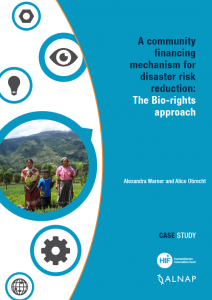Shaping the future: Our strategy for research and innovation in humanitarian response.

Shaping the future: Our strategy for research and innovation in humanitarian response.

 This case study concerns a bio-rights project carried out in partnership by CARE Netherlands and Wetlands International in western Guatemala. Bio-rights is a microcredit finance mechanism that unites community and ecosystem-based approaches to disaster risk reduction (DRR). Its innovation lies in the application of (i) combined sustainable livelihoods/ ecosystem restoration programming to reduce disaster risk; and (ii) a financial incentive mechanism used in sustainable development in a DRR context.
This case study concerns a bio-rights project carried out in partnership by CARE Netherlands and Wetlands International in western Guatemala. Bio-rights is a microcredit finance mechanism that unites community and ecosystem-based approaches to disaster risk reduction (DRR). Its innovation lies in the application of (i) combined sustainable livelihoods/ ecosystem restoration programming to reduce disaster risk; and (ii) a financial incentive mechanism used in sustainable development in a DRR context.
This is one of 15 case studies undertaken by ALNAP in partnership with Elrha’s Humanitarian Innovation Fund (HIF), exploring the dynamics of successful innovation processes in humanitarian action. The case studies examine what good practice in humanitarian innovation looks like, what approaches and tools organisations have used to innovate in the humanitarian system, what the barriers to innovation are for individual organisations, and how they can be overcome. The case studies are synthesised in the summary report, ‘More than just luck: Innovations in humanitarian action‘.

 Please upgrade your browser
Please upgrade your browser
You are seeing this because you are using a browser that is not supported. The Elrha website is built using modern technology and standards. We recommend upgrading your browser with one of the following to properly view our website:
Windows MacPlease note that this is not an exhaustive list of browsers. We also do not intend to recommend a particular manufacturer's browser over another's; only to suggest upgrading to a browser version that is compliant with current standards to give you the best and most secure browsing experience.